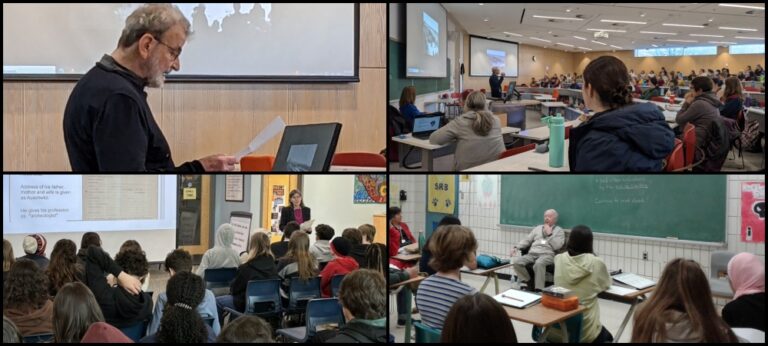The CHES Speakers’ Bureau includes Holocaust survivors and children of survivors who visit educational institutions by invitation to speak about their personal Holocaust survival experiences. Click below to request a visit:

Prepare for a Survivor Visit
Who is a Holocaust survivor? A descendant?
A Holocaust survivor is a Jewish person who survived the Nazi persecution during World War II. A descendant is the child or grandchild of a survivor.- Jessica Fiksel, born in 1930 in Lwow, Poland, died in 2020 in Ottawa, Ontario, Canada. Child survivor, survived by hiding in a barn dugout for 22 months.
- Cantor Moshe Kraus, born in 1923 in Uzhorod, Czechoslovakia, died in 2023 in Ottawa, Ontario, Canada. Survived Bor labor camp (Serbia) and the Bergen-Belsen concentration camp.
Recommended Lesson Plans to Teach the Holocaust
- 2023, November: Introduction to the Holocaust – New Grade 6 Social Studies Holocaust Curriculum by Alyssa Novick, Ashbury College Introduction to the Holocaust was developed to answer the need for resources for Ontario’s new grade 6 Social Science Curriculum. It was developed to help teachers acquaint themselves with the topic of the Holocaust and to introduce their students to the concept of the Holocaust and its historical context. The lesson plan was developed by Alyssa Novick of Ashbury College. Get the Lesson Plan
- 2021, November, Testimonies of the Holocaust, Inspiring Change Through Legacy: In-depth Exploration of the Voices of Holocaust Survivors, Lesson Plan Two, with Sophia Mirzayee and Kenra Mroz. Lesson Plan Two The Voices of Holocaust Survivors will assist teachers in preparing for a visit with a survivor, and is based on the testimonies of Holocaust survivors who made Ottawa their home, recorded by CHES in 2016. Get the Lesson Plan
Prepare for the Visit and the Experience
Remind your students that the Holocaust survivors are aging. Your students will be the last generation to hear her or his testimony firsthand. Explain why it is important to hear such testimony. Present the essential information about the survivor and her or his story, share the recorded testimony (if available), and encourage discussion. Ask the class to prepare questions for the survivor. Share What Your Students Have Learned About the Holocaust. Share the class questions with the survivor before he or she arrives. Explain what the students already know from books they have read, movies they have seen, and what their interests are.Encourage Students to Be Courteous. Respect the survivor by listening attentively. Encourage questions and discussion. Prepare some questions yourself; they may help students to formulate and ask their own questions and get the discussion going.
Take photos and/or keep track of comments; we love to share them!
Write To Us! Our speakers enjoy reading about the impressions of the students they have met. Encourage your students to write to us and share their thoughts and reactions. Email us at info@chesatottawa.ca
We will forward emails to the survivor who met your class.
Survivors Speak to Students At No Charge
Our survivors do not charge for speaking about their experiences, believing that their stories should be shared as widely as possible. CHES is a charity that provides free educational resources to schools. Please consider supporting CHES. Your donation will allow us to continue providing accessible Holocaust Education programs for free to all.
